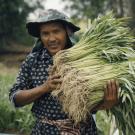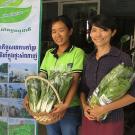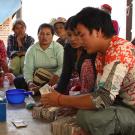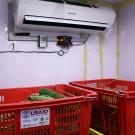This international project team is focusing efforts on linking smallholder farmers to other value chain actors, to connect vegetable production with market demand. This effort builds on a previously completed Horticulture Innovation Lab project and integrates with other USAID-funded programs to determine how best to cultivate a sustainable "safe vegetable" value chain to increase food security in Cambodia.
Recent estimates have determined that more than 65 percent of vegetables in Cambodia are imported, mostly from China, Vietnam and Thailand. Demand for domestically produced safe vegetables is strong due to Cambodian consumers’ national pride and a perception that domestically produced vegetables are better and safer due to lower chemical use. Addressing challenges in meeting this demand are the focus of this project.
"Safe vegetables" promote health and are free of chemical and microbiological hazards. "Safe vegetable value chains" include input providers, farmers, collectors, food distribution and value-added processing facilities, and marketers who sell directly to consumers. As key actors in safe vegetable value chains, smallholder farmers are primed to increase their incomes and improve their food security. Furthermore, women leaders manage many functions of the small-scale farmers, small-scale collectors, retailers, and wholesalers in these value chains. This value chain also needs to function within the landscape of local and national policies. Building a safe vegetable value chain requires more than just introducing potential partners and technologies. This is particularly true in Cambodia where a low level of trust between value chain actors is a barrier to establishing strong links within the value chain. This lack of social capital in Cambodia affects the sustainability of the safe vegetable value chain which depends upon partners developing trusted working relationships.
Our approach to identify and solve problems is based on participatory research where we engage local people as partners in testing, assessing, refining and innovating hard and soft technologies as well as scaling strategies. Hard technology innovations are tangible items that can be introduced and adapted to improve deficits faced by actors in the value chain — for example: new seed varieties, compost, integrated pest management techniques, low-cost water distribution systems, proper postharvest handling, packing centers, cold storage and distribution systems. Within our team's approach, soft technologies include participatory training and research programs with follow-up mentoring. We will incorporate methodologies based on our own adaptation of the conventional Participatory Action Research paradigm to define problems and then work together with local value chain actors, other research teams and development organizations to seek solutions that function in Cambodia. Thematically, the project team will address:
- Limitations in horticulture and postharvest practices that affect phytosanitation and year-round availability of safe vegetables, focusing on market linkages and how problems can be solved through innovative technologies and training
- Limitations in linkages between safe vegetable value chain actors to promote trust and long-term business relationships
- Limitations in cold-chain distribution, marketing and selling of safe vegetables to access domestic markets, seizing on an opportunity to displace imports
- Limitations to scaling of successful technologies, practices and market linkages across the targeted Feed the Future region and, eventually, county-wide in Cambodia
The above listed themes will be addressed through activities that include:
- Pilot tests of various horticulture and postharvest technologies with potential to improve the safe vegetable value chain
- Field tests of promising technologies and market linkages with potential to improve the safe vegetable value chain
- Research approaches that promote innovation and adoption of technologies and strengthen market linkages in support of the local safe vegetable value chain
- Building human capacity, particularly of farmers and other value chain actors, to participate in a sustainable, domestic safe value chains




